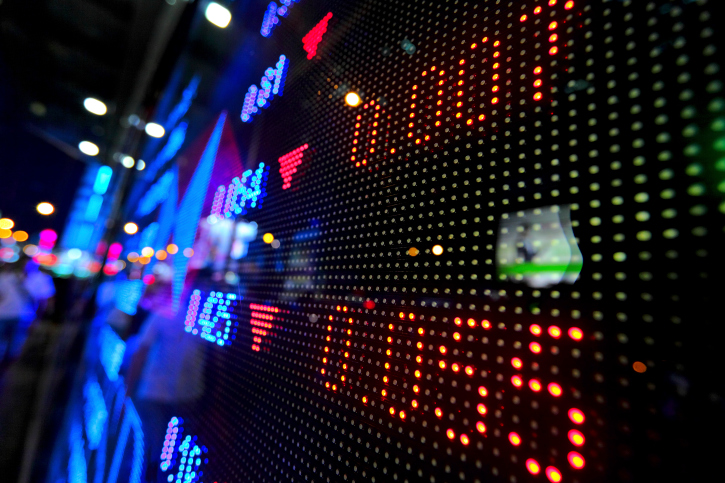Why Stocks Keep Plunging and What to Do Now
The news is glum on several fronts, but the prospects for a recession remain slim. It’s important to stick with your plan.


Profit and prosper with the best of Kiplinger's advice on investing, taxes, retirement, personal finance and much more. Delivered daily. Enter your email in the box and click Sign Me Up.
You are now subscribed
Your newsletter sign-up was successful
Want to add more newsletters?
Take a deep breath and repeat after me: “It’s not 2008. It’s not 2008. It’s not 2008.”
Yes, volatility, especially volatility to the down side, can be frightening. Losses, occasionally big losses, come with the turf when you invest in stocks. But there’s no reason to think that the current pullback will be anything like 2008, when the stock marketed plummeted 37%. So this is not the time to panic and make drastic changes to your portfolio.
Following today’s plunge in share prices, the broad U.S. market is within shouting distance of its first correction—a drop of at least 10%—since 2011. With Standard & Poor’s 500-stock index sinking another 0.8% today, the market is now 7.8% below its record high, set on September 18. At one point today, the index was down as much as 3%.
From just $107.88 $24.99 for Kiplinger Personal Finance
Become a smarter, better informed investor. Subscribe from just $107.88 $24.99, plus get up to 4 Special Issues

Sign up for Kiplinger’s Free Newsletters
Profit and prosper with the best of expert advice on investing, taxes, retirement, personal finance and more - straight to your e-mail.
Profit and prosper with the best of expert advice - straight to your e-mail.
What’s behind the market’s rapid deterioration? Here are five driving factors:
1. Concerns about a global economic slowdown and its eventual impact on the U.S. economy. Analysts are especially worried about weakness in Europe, where some economies are on the verge of descending into deflation. They worry, too, that China’s growth may be decelerating at a much more rapid pace than had been expected.
2. Jitters over a super-strong U.S. dollar. Although a strong greenback is positive in some ways (for example, it makes imported goods cheaper for Americans), it can be problematic for U.S.-based multinational companies because it makes their products and services more expensive to foreign customers. Plus, money earned overseas gets translated to fewer bucks as the dollar gains.
3. Plunging oil prices. While lower prices at the pump are a blessing for motorists, they harm many energy companies and their stocks. Moreover, the drop in crude raises questions about the stability of countries, such as Russia and Venezuela, whose economies are closely tied to energy.
4. Geopolitical instability. Investors worry about the rise of ISIS, fears of Russian expansionism, and the potential for an explosion in Hong Kong.
5. Ebola. Says Bank of America Merrill Lynch: “The Ebola crisis is rapidly bringing to the world’s attention the growing risk of a pandemic….The economic fallout from a severe pandemic could cause global GDP [gross domestic product] to fall by almost 5%.”
Put all of these factors together and you have the ingredients for a vicious stock market downturn. Note that one item not on my list of concerns is the market’s valuation. Even when the S&P index hit its peak a month ago, it didn’t appear excessively overvalued. This was not a repeat of early 2000 when the S&P 500 traded at more than 25 times estimated earnings. At its most recent top, the market traded at 16 times estimated earnings.
Based on what's known today about U.S. economic conditions, I think stocks are fairly valued – and, in some cases, may be slipping into bargain territory as the market continues to retreat.
Are we merely witnessing a correction or in the early stages of a bear market? That depends on what happens to the economy. Bear markets sometimes occur even as the economy continues to expand. (The late economist Paul Samuelson famously quipped that the stock market had predicted nine of the last five recessions.) But if we're heading for an economic contraction, we're sure to have a bigger decline. Bear markets and recessions go hand in hand. Kiplinger’s does not foresee the U.S. entering a recession. In fact, we see the economy growing a solid 3.0% in 2015.
The alternatives to stocks remain pitiful. Cash still yields nothing. Government bonds have performed nicely since the stock-market correction began, but yields have come down as prices have gone up, adding to the risk of owning Treasuries. The 10-year Treasury bond closed today with a yield of 2.09%, nearly a full percentage point below where it was at the start of 2014. Gold has perked up a bit during the stock-market pullback, but it’s also risky and may not continue to zig while stocks zag.
My best advice: Review your investments, and make sure you can handle additional declines in your portfolio. If you can’t, you probably have too much in stocks. If you're dollar-cost averaging into stock funds (through, say, a 401(k) plan), stick with the plan. You’ll be buying low as stock prices fall. If you buy individual stocks, make a shopping list of stuff you'd like to own at specific price targets. Don't try to time the market.
Profit and prosper with the best of Kiplinger's advice on investing, taxes, retirement, personal finance and much more. Delivered daily. Enter your email in the box and click Sign Me Up.

-
 Americans, Even With Higher Incomes, Are Feeling the Squeeze
Americans, Even With Higher Incomes, Are Feeling the SqueezeA 50-year mortgage probably isn’t the answer, but there are other ways to alleviate the continuing sting of high prices
-
 Hiding the Truth From Your Financial Adviser Can Cost You
Hiding the Truth From Your Financial Adviser Can Cost YouHiding assets or debt from a financial adviser damages the relationship as well as your finances. If you're not being fully transparent, it's time to ask why.
-
 How to Manage a Disagreement With Your Financial Adviser
How to Manage a Disagreement With Your Financial AdviserKnowing how to deal with a disagreement can improve both your finances and your relationship with your planner.
-
 If You'd Put $1,000 Into Caterpillar Stock 20 Years Ago, Here's What You'd Have Today
If You'd Put $1,000 Into Caterpillar Stock 20 Years Ago, Here's What You'd Have TodayCaterpillar stock has been a remarkably resilient market beater for a very long time.
-
 I'm a 55-Year-Old Dad. Here’s How My 28-Year-Old Daughter Showed Me That AXP Is Still a Solid Investment
I'm a 55-Year-Old Dad. Here’s How My 28-Year-Old Daughter Showed Me That AXP Is Still a Solid InvestmentAmerican Express stock is still a solid investment because management understands the value of its brand and is building a wide moat around it.
-
 If You'd Put $1,000 Into AMD Stock 20 Years Ago, Here's What You'd Have Today
If You'd Put $1,000 Into AMD Stock 20 Years Ago, Here's What You'd Have TodayAdvanced Micro Devices stock is soaring thanks to AI, but as a buy-and-hold bet, it's been a market laggard.
-
 If You'd Put $1,000 Into UPS Stock 20 Years Ago, Here's What You'd Have Today
If You'd Put $1,000 Into UPS Stock 20 Years Ago, Here's What You'd Have TodayUnited Parcel Service stock has been a massive long-term laggard.
-
 How the Stock Market Performed in the First Year of Trump's Second Term
How the Stock Market Performed in the First Year of Trump's Second TermSix months after President Donald Trump's inauguration, take a look at how the stock market has performed.
-
 If You'd Put $1,000 Into Lowe's Stock 20 Years Ago, Here's What You'd Have Today
If You'd Put $1,000 Into Lowe's Stock 20 Years Ago, Here's What You'd Have TodayLowe's stock has delivered disappointing returns recently, but it's been a great holding for truly patient investors.
-
 If You'd Put $1,000 Into 3M Stock 20 Years Ago, Here's What You'd Have Today
If You'd Put $1,000 Into 3M Stock 20 Years Ago, Here's What You'd Have TodayMMM stock has been a pit of despair for truly long-term shareholders.
-
 If You'd Put $1,000 Into Coca-Cola Stock 20 Years Ago, Here's What You'd Have Today
If You'd Put $1,000 Into Coca-Cola Stock 20 Years Ago, Here's What You'd Have TodayEven with its reliable dividend growth and generous stock buybacks, Coca-Cola has underperformed the broad market in the long term.